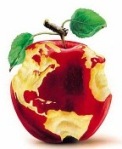70° 45' 18" W
Learn more about Lat/Long
The EarthView team will be making its first visit to Scituate. The name of the town is derived from a Wampanoag word for the "cold brook" that feeds its harbor, but coincidentally sounds like an English word for an important geographic concept!
Because geography is the study of places, geographers are very interested in the many ways in which places can be described, categorized, and compared. Geography distinguishes between two equally important ways of describing places: site and situation. In choosing where to locate a new settlement (or a store or a house or an office), characteristics of the place itself (site) must be balanced with its position relative to other places (situation). The web site of the Barcelona Field Studies Centre lists several examples of site and situation relative to the location of that city.
What are the site and situation (or scituation) characteristics that led to the settlement of Scituate? What aspects of each continue to make it a popular place to live?
Geography Happenings on November 18
1993 A record for November cold was set on this date, when the temperature in North Siberia reached negative 55 degrees Celcius (that's negative 67 Farenheit)! Siberia is known for temperature extremes because of its position in the upper-mid latitudes and its continentality. A look from inside EarthView confirms that the interior of Asia is farther from the moderating influence of oceans than is any other place on earth. Incidentally, the radio program On Point recently featured an interview with Ian Frazier about his travels in Siberia, in which he discusses the human and physical geography of this place that is both vast and remote.
1987 The Congressional report on the Iran-Contra Affair was released.
1980 A treaty between El Salvador and Honduras formally ended the so-called Soccer War of 1969, a brief but deadly conflict that had actually lasted only 100 hours. Because soccer is important throughout Latin America, some people assume that soccer was the cause of this war, which it was not. Tensions between the two countries had been building over economic issues, leading to the mistreatment of soccer players during a match, but the real conflict was over the treatment of workers.
1976 Democracy returned to Spain after 37 years of dictatorship.
1961 President Kennedy sent 18,000 soldiers as advisors to Vietnam.
1956 Although it technically became independent of France in March of 1956, November 18 is celebrated as Independence Day in Morocco, when King Mohammed declared independence upon his return from exile.
1941 Mussolini's forces left Ethiopia, in the early days of World War II.
1929 The Atlantic Ocean's largest earthquake broke the transatlantic telephone cable in 28 places.
1909 The United States invaded Nicaragua, later overthrowing President Zalaya.
1902 The Teddy Bear is named for President Teddy Roosevelt.
1883 Time zones are established in the United States and Canada, to simplify train schedules.
1805 Lewis and Clark reach the Pacific Ocean, becoming the first U.S. citizens to cross the continent.
1755 Boston's strongest earthquake occurred, though nobody was injured.
1307 William Tell shoots an apple off his son's head, though it probably did not look like this one!
What are the site and situation (or scituation) characteristics that led to the settlement of Scituate? What aspects of each continue to make it a popular place to live?
Geography Happenings on November 18
1993 A record for November cold was set on this date, when the temperature in North Siberia reached negative 55 degrees Celcius (that's negative 67 Farenheit)! Siberia is known for temperature extremes because of its position in the upper-mid latitudes and its continentality. A look from inside EarthView confirms that the interior of Asia is farther from the moderating influence of oceans than is any other place on earth. Incidentally, the radio program On Point recently featured an interview with Ian Frazier about his travels in Siberia, in which he discusses the human and physical geography of this place that is both vast and remote.
 |
| Vladimir Putin in Siberia, AP Photo from WBUR |
1980 A treaty between El Salvador and Honduras formally ended the so-called Soccer War of 1969, a brief but deadly conflict that had actually lasted only 100 hours. Because soccer is important throughout Latin America, some people assume that soccer was the cause of this war, which it was not. Tensions between the two countries had been building over economic issues, leading to the mistreatment of soccer players during a match, but the real conflict was over the treatment of workers.
1976 Democracy returned to Spain after 37 years of dictatorship.
1961 President Kennedy sent 18,000 soldiers as advisors to Vietnam.
1956 Although it technically became independent of France in March of 1956, November 18 is celebrated as Independence Day in Morocco, when King Mohammed declared independence upon his return from exile.
1941 Mussolini's forces left Ethiopia, in the early days of World War II.
1929 The Atlantic Ocean's largest earthquake broke the transatlantic telephone cable in 28 places.
1909 The United States invaded Nicaragua, later overthrowing President Zalaya.
1902 The Teddy Bear is named for President Teddy Roosevelt.
1883 Time zones are established in the United States and Canada, to simplify train schedules.
1805 Lewis and Clark reach the Pacific Ocean, becoming the first U.S. citizens to cross the continent.
1755 Boston's strongest earthquake occurred, though nobody was injured.
1307 William Tell shoots an apple off his son's head, though it probably did not look like this one!



No comments:
Post a Comment